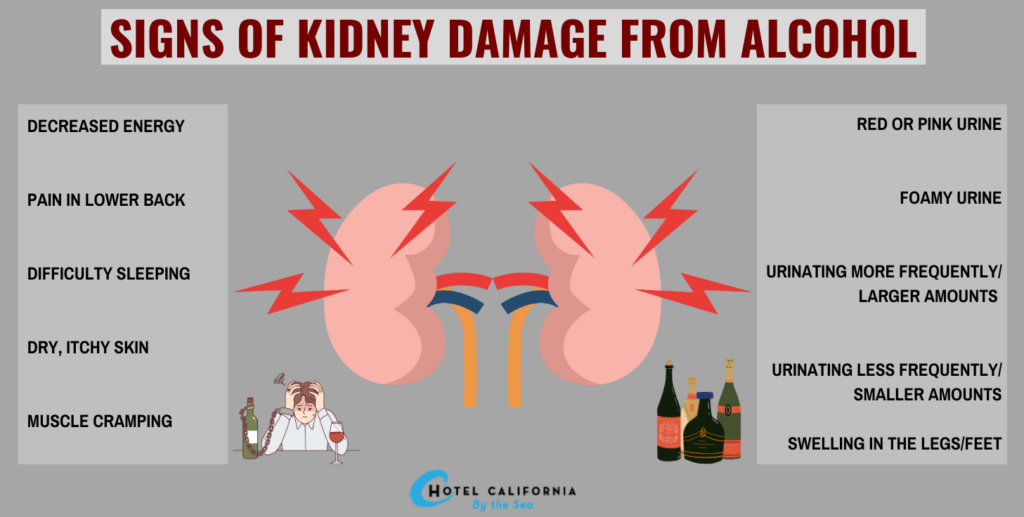Can Kidneys Recover from Alcohol Damage?
Alcohol is one of the world’s most abused substances. Alcohol abuse can affect multiple systems in the body including the brain, heart, liver and kidneys. We often hear of those with alcohol use disorder suffering from brain changes, cardiovascular disease and liver damage. However, alcohol abuse can also profoundly impact the kidneys. In fact, a 2018 study found that alcohol use disorder has been linked to increasing the likelihood of a person developing a diagnosis of chronic kidney disease.

Kidneys are two fist-sized, bean-shaped organs located on either side of the spine. One of the primary functions of the organ is the remove excess waste, and fluids and essentially filter out any harmful substances from the blood. Blood filtering is an important function of the kidneys. It helps to remove waste and toxins to help the body maintain a healthy balance. The kidneys help to balance minerals in the blood by controlling essential minerals such as sodium and potassium in the body. This helps to ensure nerves, muscles and pH levels are at the correct levels. The kidneys help manage fluids such as regulating water levels in the body to keep the body hydrated. The kidneys are also in charge of blood pressure control through the release of a specific hormone called renin. The kidneys also manage the production of red blood cells by producing a hormone that allows the bone marrow to make red blood cells, which are essential for oxygen delivery.
Alcohol directly interferes with kidney functions through acute or chronic consumption. If a person drinks excessively or binge drinks, they can cause harm to the organ and make it more difficult to properly perform its functions. Excessive alcohol use over time will cause kidney damage and even double the risk of developing chronic kidney disease. Chronic kidney disease is a condition so extreme, there is no cure.
What is the impact of Alcohol on the Kidneys?
Kidneys contain tiny finger-like structures called nephrons. The nephrons work by filtering out waste products from the blood to maintain a balance of water, minerals, and other fluids in the bloodstream. According to the National Kidney Foundation, excessive alcohol use can damage the kidneys and worsen existing kidney disease by impacting the nephrons and disrupting their ability to filter the blood properly.
According to the World Health Organization, there is no “safe” level of alcohol consumption. The more you drink, the greater risk you put yourself for health issues including kidney damage. Dangerous drinking patterns such as excessive drinking or binge drinking can result in acute kidney injury. It causes the kidneys to work harder and can cause them to become overwhelmed and unable to filter the blood and maintain a correct fluid balance. This occurs when toxins from the alcohol build up in your blood so quickly that the kidneys are unable to properly filter them out.

Excessive alcohol consumption also leads to dehydration. Alcohol is a diuretic and promotes water loss. So the more alcohol you consume, the more water loss your body will experience. This will intensify the work of your kidneys to regulate water levels. This can cause hormone fluctuations influencing the body’s water, salt, and electrolyte balance. The kidneys will need to work to harder keep the blood and rest of the body perfectly balanced and hydrated.
Alcohol abuse can also impact changes in blood pressure. Too much alcohol can cause a rise in blood pressure. In fact, high blood pressure is a very common cause of kidney disease. More than two drinks per day can increase the chances of having high blood pressure. For those who drink and already have high blood pressure conditions, it can further impact kidney functions. The American Heart Association says chronic hypertension can harm the blood vessels that supply the nephrons causing more kidney damage.
What are the Signs of Kidney damage?
Acute kidney injury is a condition usually caused by heavy alcohol consumption in which there is a sudden decrease in kidney function. This condition can usually be resolved with time within a few days after alcohol drinking is stopped. This type of kidney damage can be reversed and patients can recover.
Another more serious sign of kidney damage is when a person develops chronic kidney disease. Regular and heavy drinking will eventually lead to chronic kidney disease. When this occurs, there is a gradual loss of kidney function due to the long-term effects of alcohol. The American Kidney Foundation says there are five stages of chronic kidney disease. Stage one presents the earliest and mildest stage of the disease. When a person has reached stage five, the disease has progressed to advanced and severe. Once a person has developed chronic kidney disease, they will need dialysis or a kidney transplant. There is no cure for chronic kidney disease.
Check Your Insurance Coverage for FREE
Find out if your insurance covers addiction treatment in minutes. We accept most insurance!
Common symptoms of Chronic Kidney Disease:
- Nausea and vomiting
- Loss of appetite
- Weakness and fatigue
- Sleep disturbances
- Decreased alertness
- Decreased urine output
- Muscle cramps, swelling on feet or ankles
- Chest pain
- Shortness of breath
- Hypertension
- Anemia
- Loss of blood calcium levels
- Increased susceptibility to infections
Other signs of kidney damage include electrolyte imbalance, glomerulonephritis, and increased risk of kidney stones. Kidney damage can disrupt the balance of sodium and potassium and strain kidney functions to work harder in order to create stable levels. Glomerulonephritis is the inflammation of the small blood vessels in the kidneys and can cause impaired function, which will eventually lead to long-term damage. Excessive alcohol consumption can lead to the formation of kidney stones. Kidney stones can obstruct the urinary tract and cause the person to experience kidney pain.
Can Kidneys Recover from Alcohol Damage?
When it comes to recovering from alcohol-induced kidney damage, the extent of recovery depends on the severity of the damage, the person’s overall health and the person’s commitment to abstinence from alcohol. For those who develop acute kidney injury, this is a less severe symptom of kidney damage. Patients diagnosed with this state can often make a full recovery. For those who develop chronic kidney disease, the damage is permanent and will often need medication and even an organ transplant.
Reach out to Hotel California by the Sea
We specialize in treating addiction and other co-occurring disorders, such as PTSD. Our Admissions specialists are available to walk you through the best options for treating your addiction.
Treatment for Alcohol Use Disorder
The kidneys are one of the organs affected by alcohol abuse. Kidneys help to detoxify and remove waste and toxins from the body to help you stay clean and healthy. Kidneys also support blood pressure regulation and healthy red blood cell production. Excessive alcohol consumption significantly and negatively impacts kidney functions and can lead to organ damage, organ failure and the need for an organ transplant. Professional behavioral health treatment programs such as Hotel California by the Sea provide specialized programs in alcohol use disorder.
We understand that alcohol addiction can be a difficult disease to overcome. We offer detox, residential, PHP and IOP treatment options. We also utilize evidence-based programs such as CBT, DBT and group therapy. We have a variety of other support services and programs designed to help our clients recover. Hotel California by the Sea is dedicated to providing the support, resources and tools our clients need to overcome their addiction.
References:
https://www.kidney.org/kidney-topics/alcohol-and-your-kidneys
https://www.medicalnewstoday.com/articles/can-drinking-cause-kidney-failure
https://www.healthline.com/health/kidney-health/can-drinking-alcohol-cause-kidney-cancer
https://pmc.ncbi.nlm.nih.gov/articles/PMC6826793/
https://zinniahealth.com/substance-use/alcohol/kidneys
